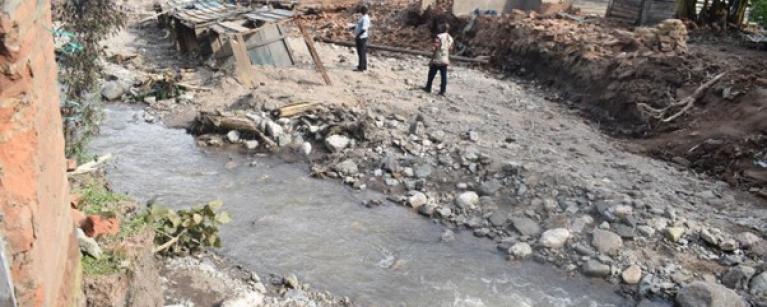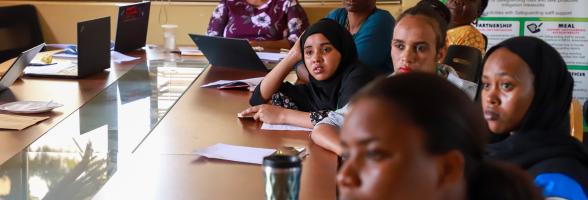Creating a Collective Voice for Resilience
In Western Uganda, communities grapple with a range of humanitarian crises, from floods and landslides to food shortages, often with limited coordination and support. For years, local organizations faced the daunting challenge of responding to these emergencies without a unified platform. Recognizing this need, the Western Uganda Humanitarian Platform (WUHP) was established in 2022 with the support of Oxfam and under the stewardship of World Voices Uganda- a local Organization based in Western Uganda . Its mission is clear: to bring together local actors, ensuring their voices shape policy influencing for disaster response and improved service delivery for the community. .
A Purposeful Collaboration
The primary purpose of WUHP is to cultivate collaboration among local humanitarian organizations to enhance the effectiveness of disaster management. Through this partnership, members can create a strong, organized response to humanitarian challenges, advocate for local action, and influence policies that prioritize their communities' needs. Gard Benda, Country Director of World Voices Uganda, the Organisation that oversees the platform, emphasizes the significance of WUHP, noting that local actors are the first responders in any disaster but are often overlooked in decision-making and funding allocations. By strengthening their leadership role, WUHP is transforming disaster response from externally dictated interventions to community-driven evidence-based solutions.
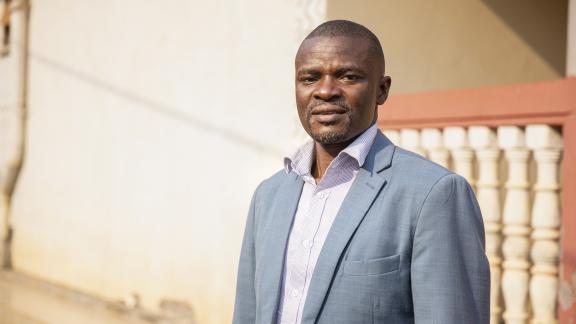
Gard Benda, the Country Director of World Voices Uganda, which oversees the WHUP emphasises the importance of the platform transforming disaster response.
Goals and Objectives of the WUHP
At the heart of WUHP’s efforts is the goal of empowering local organizations to lead in disaster preparedness, response, and advocacy. Specific objectives include: 1. Building a network of local humanitarian actors to strengthen collaboration and knowledge-sharing. 2. Enhancing the capacity of member organizations to respond effectively to emergencies. 3. Advocating for policies that prioritize the needs of vulnerable communities and encourage localized humanitarian action. Today, the platform is a combination of fifty-six strong women-led and men-led organizations, including refugee-led groups and human rights and disability advocates. This diversity ensures that response aid reaches those who are often excluded.
Membership
Membership in WUHP is selective based on community impact and alignment with WUHP values. Organizations need to demonstrate strong community ties and a commitment to humanitarian principles. The platform’s management carefully vets new members to ensure that their dedication to community action aligns with WUHP's goals. This ensures that membership is not just a title but an active commitment to meaningful change in the humanitarian context. Having started with only seven member organisations at its formation in 2022, the platform had by March 2025 registered up to fifty-six local organisations each with a humanitarian component within their work.
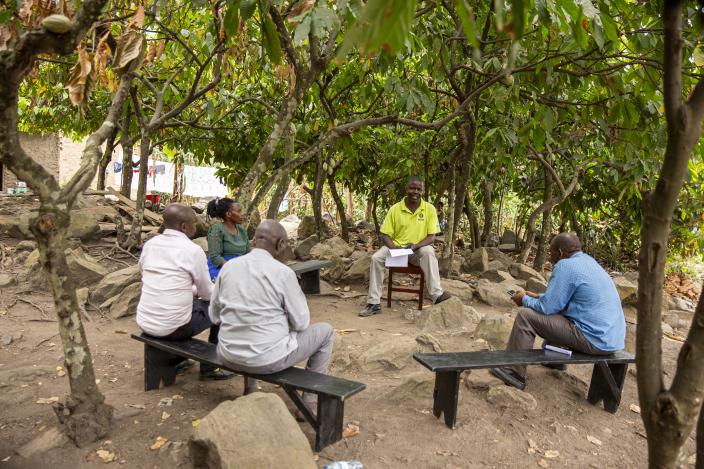
Humanitarian workers always conduct needs assesements and engage communities to best understand their needs.
Committees: Driving Preparedness and Response
WUHP organizes itself through several essential committees that focus on disaster preparedness and response:
- Emergency Response Committee: This group is ready to mobilize quickly, conducting assessments during crises to identify immediate needs and coordinate local responses.
- Policy and Advocacy Committee: Engaging with local and national authorities, this committee works to advocate for policies that support local disaster response efforts and prioritize vulnerable populations for improve service delivery.
- Capacity Building and Training Committee: This committee is crucial in identifying training needs and providing support to strengthen the skills of all member organizations.
WUHP’s led Inclusivity and Ethical Response
The work of the committees is strongest in the event of a disaster. For instance, WUHP employs a systematic approach to quickly assess needs through its Emergency Response Committee. This assessment process prioritizes inclusivity, ensuring that the most vulnerable groups, such as women-headed households, individuals with disabilities, and the elderly, are recognized and assisted appropriately.
Rebecca Angumye, a program specialist with the WUHP partner, The Joint Effort to Save the Environment (JESE), and also the WUHP General Secretary and Gender Coordinator, emphasizes, “When we design proposals, we mandate collaboration.Men don’t decide for women.”
This commitment to inclusivity is integral to WUHP’s overall mission. By ensuring that marginalized voices are heard and considered, WUHP fosters an environment of trust and engagement among all stakeholders.
This approach reflects the organization’s adherence to "do no harm" principles, reinforcing the importance of safeguarding and safe programming during response actions.
An example is in Kyegegwa district, where the Joint Effort to Save the Environment (JESE) addressed the alarming rise in teenage pregnancies among populations displaced by natural disasters. JESE engaged local actors, including district authorities, in conducting sensitization and dialogue meetings on safeguarding, safe programming, and the prevention of sexual exploitation and harassment, aligning with Uganda’s child protection and humanitarian laws.
Government Collaboration: A Game-Changer for Disaster Response
A strong partnership between WUHP and local government has been key to improving disaster coordination. Kikusa Musa, Emergency Response Focal Person for Kasese District, explains: “When a disaster strikes, we alert partners, hold coordination meetings, and assign response teams. No duplication, no confusion—just action.”
Local governments provide crucial data, mapping high-risk areas and coordinating contingency plans. However, funding remains a challenge. Musa calls on partners like Oxfam and WUHP to support these efforts, ensuring preparedness plans are well-funded.
One major shift has been the preference for cash assistance over food aid, allowing affected families to purchase what they need most. “Multipurpose cash transfers restore dignity,” Musa explains. “People don’t have to rely on handouts—they make their own choices.
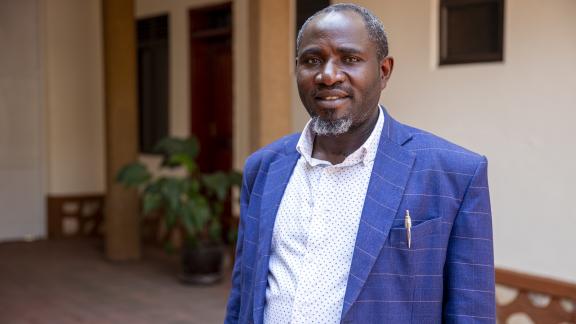
Kikusa Musa, the Kasese district disaster management committee chairperson credits the WUHP for improving coordination in the effect of disasters.
Strengthening Capacity: A Strategic Commitment
Understanding that effective disaster response requires skilled local organizations, WUHP places significant emphasis on capacity strengthening. The platform actively identifies capacity gaps by engaging with its members. Training programs are then provided by partners like Oxfam, focusing on essential areas like emergency response planning, financial management, safeguarding and safe programming, community engagement, and advocacy. The skills and knowledge gained from these training empower local organizations to lead interventions effectively. Let them share with you the training that Oxfam Conducted on safeguarding and safe programming; including M&E. This was done with funding under the ERF. They showcase how this is being used and supporting them.
ERF, an enabling factor
To address limitations, uncertainty and delays in accessing funding for local humanitarian response, WUHP with support from Oxfam in 2022 launched the Emergency Response Fund (ERF). This mechanism which has seen two phases of financing from Oxfam across the years 2023,2024, has incentivised fast-tracked response actions by facilitating a 12-hour call for proposal, vetting and grant awarding process to local actors, enabling them to reach communities within 72 hours of occurrence of a natural disaster.
ERF-supported local actor response and recovery actions have had a marked impact on the lives of 56,272 Find out whether this figure is aligned to what they had shared with Janice-Oxfam America project participants reached by 2024. For example, in Ntoroko District, where recurrent displacement due to flooding has left many families which previously depended on fishing struggling, ERF funding channelled through WUHP’s partner (JESE), enabled a livelihoods transformative intervention. Marunga Beatrice, a mother of four, received support through a women's livelihoods training program by JESE: "Before this, we were entirely dependent on handouts. Now, we are entrepreneurs, making and selling liquid soap. “From the proceeds, we can feed our children, pay school fees, and rebuilt our lives. We have also started a women’s group that saves every week, allowing us to grow our business"
Beyond emergency relief, the ERF is also addressing long-term resilience. By prioritizing gender-responsive budgeting, the fund ensures that at least 40% of resources support women-led and marginalized groups. This approach not only provides immediate assistance but also strengthens local economies and social structures.
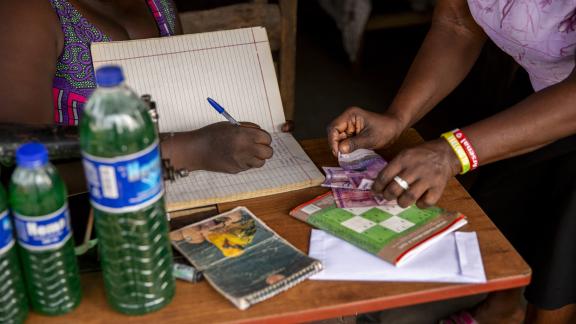
Through Emergency Response Funding which was channeled through WUHP partner JESE, livelihood training programs have trained women groups on liquid soap making and selling which has supplemented their livelihoods.
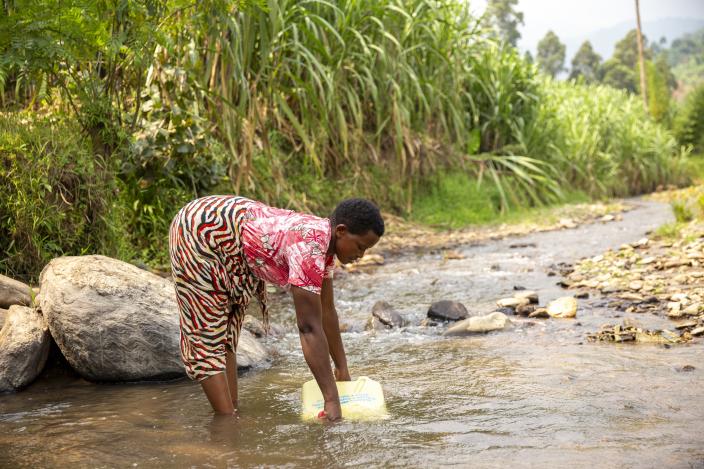
Muhindo Annet, a resident of Kyarumba town council, Kasese who was severely affected by floods, draws water from a river stream in Kasese.
Muhindo was one of the participants supported by the WUHP through FURA who supported her with WASH materials following the flooding.
A Call for Greater Investment in Localized Humanitarian Action
Looking ahead, WUHP aims to expand the Emergency Response Fund, deepen government partnerships, and enhance early warning systems. Benda urges donors and development partners to invest in locally led financing facilities, arguing that scaling up the Emergency Response Fund could exponentially increase the platform’s ability to save lives and build resilience.
He also calls for a shift in donor strategies, encouraging International Non-Governmental Organizations (INGOs) to prioritize direct partnerships with local humanitarian actors rather than competing with them for funding. “The Grand Bargain commitments emphasize localization, yet funding still largely bypasses those on the front lines,” Benda remarks. By ensuring that resources reach local organizations directly, the humanitarian community can create a more effective, responsive, and sustainable disaster response system.
